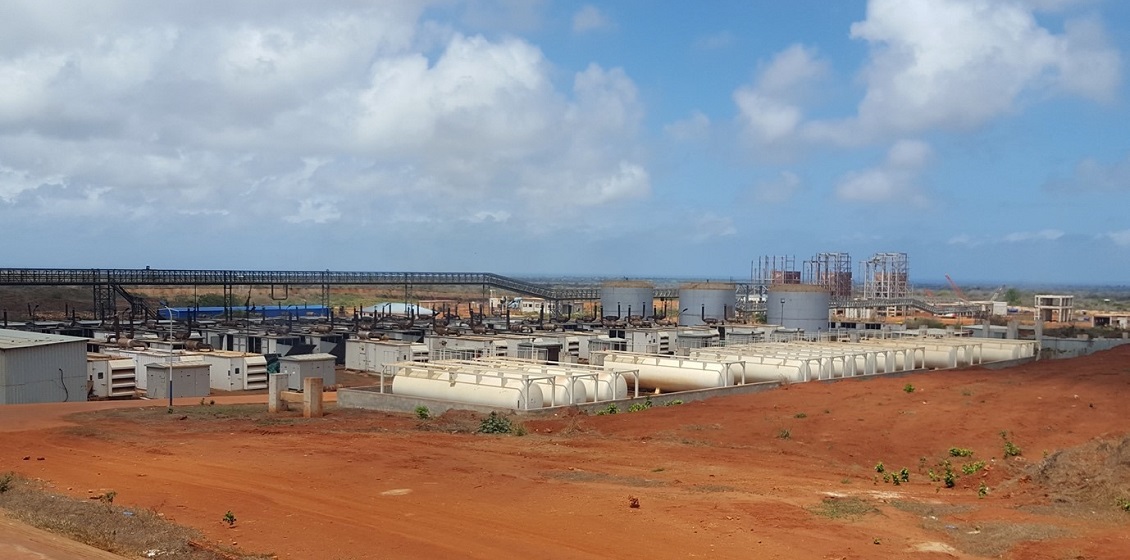Achieving UN’s Sustainable Development Goals (SDG) requires careful attention to the risk of potential contradictions between the individual goals. For instance, how do we make energy both clean, affordable and accessible? Tanzanian Doctoral researcher Thabit Jacob’s scholarly contribution highlights the complexities of the global green energy transition. Especially the challenges in the sub-Saharan countries where most people are living without electricity. The thing is that while these African countries have signed The Paris Agreement to bring down carbon emission, the region holds large coal deposits ready to generate energy.
The scope of this article seeks to reflect one of the core challenges to the SDG’s achievement, as we pay attention to the winners and losers in the green energy transition.
Roskilde University
It is February on a grey, windy and rainy day that I make my way to the Roskilde University (RUC). This day, RUC hosts its annual open house for prospect students, so the campus is pulsating with all sorts of different activities. RUC is located 30 km from Copenhagen. It has several disciplinary and interdisciplinary departments and is considered an essential academic institution in the capital area of Denmark.
I meet Thabit Jacob in the Department of Social Science and Business. As I am a bit early for our appointment, I get the chance to meet Jacob’s supervisor Associate Professor Lars Buur. He is the head coordinator of the research project, Hierarchies of Rights, of which Jacob is a part of. When we sit down in Jacob’s office, he explains that the research project is about “investment into natural resources in Africa”. The special scope of the Hierarchies of Rights project aims “to analyse how struggles related to large-scale investments into natural resources affect rights, particularly of small-holders, to land in Sub-Saharan Africa” (RUC 2015).
In November 2015, after being shortlisted among six very qualified Tanzanian researchers, Jacob was offered a full position in the project. Besides RUC, Jacob has had visiting fellowships at the University of Michigan and the University of Sheffield. He is also currently a non-resident fellow at the Initiative for Sustainable Energy at Johns Hopkins Johns Hopkins School of Advanced International Studies
Hierarchies of Rights is now coming to its end and Jacob is expected to hand-in his dissertation at the end of 2020.
I ask Jacob to explain the methodology and material he uses for his research. He describes his method as theoretical political economy conducted through qualitative research of different data. As Jacob’s project is about looking into the Tanzanian coal investments, he organizes his research at both a national and a subnational level. The national level is oriented towards the capital and its decision making on coal investment, whereas the subnational level is research in the rural field where the people who are affected by these investments live. Jacob is collecting his data through both qualitative interviews, archival research and ethnographic fieldwork.
Competing energy narratives
Jacob’s research is considered controversial to the Tanzanian government. This means that Jacob has been met with a lot of resistance when pursuing the critical work of his. Both from the people in power, but also from villagers who are reluctant to speak to him at times. Further, some of his academic colleagues in Tanzania, do not feel comfortable to be associated with him, as they fear it could bring them into trouble with authorities.
As Jacob tells me about the challenging nature of his work, he unfolds his work on what he calls Tanzania’s ‘competing energy narratives’.
Jacob explains the complex situation of a country that must deal with a very large percentage of its citizens living without electricity, while having ratified the Paris agreement to reduce carbon emission. This leaves Tanzania with two dominating narratives on the energy transition of the country. They can briefly be described as the ‘clean energy and pro-renewable narrative’ and the ‘energy security narrative’.
The conflation of the two narratives arose from “strong coalitions of civil society organizations which have formed a coalition with Northern based NGOs, mostly from Germany. They have called for a sustainable future in Tanzania which have to be powered by 100% renewable energy and clean energy fuels. On the other hand, you have another strong position, the government’s position, which is on ‘energy security’. It says that Tanzania is not energy secure and that the country has its own ambition of becoming a middle-income country by 2025. It has to build industries and to be able to do this, it has to use all its available energy resources including so-called ‘dead energy’ [coal and natural gas]”.
Obstruction of democracy
Since 2014, Tanzania has become less democratic and more authoritarian, shutting down open debates and enhancing surveillance and state sovereignty.
Jacob tells that the ‘winning’ narrative is the ‘energy security narrative’, as the recent government has imposed its power to immobilize what used to be a prolific civil society of clean-energy-activists: “Before the recent government came in, civil society had made a lot of progress and they have made much noise, but now their lives have become very hard under the current government. Before that they were able to bring in donors and get some commitment from the government in terms of reducing fossil fuels in the energy mix. The government bought into it and ratified the Paris agreement. At the same time Tanzania made its own ambitious plans on renewable energy. That has shown to be just a theoretical commitment since the actual politics has not gone that way”.
Until 5-6 years ago it was possible to have open debates in Tanzania, but this came to an end when the recent government came to power. This is evident in how the energy debate is relayed in national media: “Before the current government, these discussions were very popular in the media. The state broadcasters get more airtime than private media, but civil society has done much work in steering debates via privately-owned TVs, and they have run workshops across the country, but since the new government came in it has been much harder for civil society to operate.” Jacob explains that “the implementation of coal depends on the fragmentation of CCM (Chama Cha Mapinduzi, In English “Party of evolution”, The ruling party in Tanzania) and on the position of civil society. If civil society had maintained their momentum, the clean energy narrative might have won, but since the government has come in it has made the work conditions too hard for civil society.” Jacob tells that this has become evident, as many international NGO are experiencing severe difficulties in collaborating with Tanzania’s civil society. “My point is that civil society moved from a very open environment to a very closed environment, so now their operations have become very hard”.
I his article “Competing Energy Narratives in Tanzania: Towards the Political Economy of Coal” from 2017 (Published in African affairs, a top ranked journal), Jacob explains that the execution of coal mining in Tanzania is entangled with elite politician’s reliance on rents: “Various forms of rents are likely to emerge from coal investments. They include large-scale fiscal rents accruing to the state and the ruling elites in terms of foreign direct investment, taxes, and royalties related to coal. They also include rents that are likely to be captured and diverted into individual hands by state bureaucrats and party cadres through direct monetary bribes and from the allocation of procurement contracts to supply inputs to coal mines, as well as the profits made by the state through the supply of coal-fired power to residential, commercial, and industrial consumers. Power production and distribution is state-controlled, and this monopoly paves the way for managers of state-owned enterprises with close links to the party to extract rents” (Jacob 2017, 351). The prospects of these rents make the implementation process of the SOE mines perplex and insecure for the people affected by these implementations. Jacob tells that “when a state-owned government wants to pursue investment the idea is ‘let’s do it as quickly as we can. If people want to be compensated, we can do it later, but there is nothing stopping us.” Most of these projects are increasingly seen as ‘national’ and should be supported by everyone.
Energy justice. Winners and losers in the energy transition
Understanding the political conduct of the Tanzanian government requires thorough attention to the unequal and unjust global situation, when it comes to energy access. Jacob is calling for other researcher’s attention to ‘energy justice’ and what Jacob calls “winners and losers in energy transition”. When we discuss issues on climate change and inequality, we cannot but ignore that western countries became superpower states through coal booms (Britain’s economic development was fueled by coal and other fossil fuels. Same can be said about Australia, USA, India, China). Now Africa has all these resources that they are being told not to use. Western countries did not stop and have not stopped using fossil fuels: “Everybody in the world has the right to access clean, affordable and cheap energy (SGD 7 ‘Affordable and clean energy’). And this is where a lot of people are missing the point, especially a lot of scholars from the North. As we speak now, in Africa over 700.000.000 people don’t have access to electricity. This is something that most people just ignore. The amount that the average American is using on Christmas decorations is more than an average African uses in a year. There are these huge disparities on energy access, so it is easy to point fingers at the developing countries and ‘say stop digging coal’. When you have 7 out of 10 people living in darkness, I am asking is it justice? In terms of making winners and losers this is an important point. This is where the developed countries have been fooling the world.”
After RUC
As we already have touched upon, Jacob’s research is perceived as very controversial in Tanzania, this has to do with his various media interviews and social media commentaries related to his research and broader political developments in Tanzania which are seen to be critical. I asked him about his plans after he finishes his research at RUC. He plans to go back to Tanzania after the summer, although he knows problems might await him: “It’s a tough decision that I’ve had to make, I’m not naïve, I know it is risky. And at some point, something might happen to me. But if it is the price to pay for doing this work, so be it, because at some point you cannot avoid it”. Jacob tells me that the has experienced surveillance from the Tanzanian government while he has been doing his research in Denmark: “When I was invited (with two other Danish colleagues) to give a talk at University of Copenhagen on political updates in Tanzania ahead of the election later this year. What happened was bizarre but unsurprising. The Tanzanian embassy in Sweden sent someone to record my presentation at the University of Copenhagen. We managed to block the recording but coordinated group of loyalists were still able to record an audio somehow. That shows the ongoing government surveillance campaign and latest spying efforts on critics seems to have reached a whole new level.”
Even though Jacob has been recommended to extend his stay in Europe, he does not think it is the right thing to do: “When you believe in the kind of things you do and have not done any harm, and I just do my job as researcher, then that is worth getting in trouble for. When I am here or in the UK, I lose legitimacy [to Tanzanian people], because people point to me and accuse me having become ‘too European’, saying ‘he is out of touch with what is happening in Tanzania’, ‘he is living a luxury life in Europe’. This is why I want to go back and be able to say these things while being there”.
Scholar activism. Getting out of the Ivory tower
Jacob is getting a lot of undiscerning remarks about his academic career pursuance. A lot of people think that he is “asking for too much trouble” and by that throwing away what could have been a bright future with a position at a Tanzanian university. To Jacob there is a quintessential connection between research and activism. For Jacob it is a big problem in academia that most of its research takes place in an ‘ivory tower’, meaning that academia research distances itself from society making its impact non-existent: “Some of my fieldwork in the coal region in South-western Tanzania was being around people who struggle daily for survival, the ivory tower feels quite removed from that reality.” Similar to the Marxian critique of precursory philosophers’ efforts in only describing the world instead of changing it, Jacob wants his work to have social impact. While doing his fieldwork he has helped villagers getting legal help by linking them with city lawyers. Jacob stresses how important it is for him to give back to the people who contributes to his research.
Going back to Tanzania will challenge the continuation of Jacob’s work, but he is sure that he will continue his collaborative work with researchers in Denmark, the UK and US.
Nicklas Alexander Kirchert is Master of Modern Culture and Cultural Dissemination, UCPH, and DDRN Culture Editor
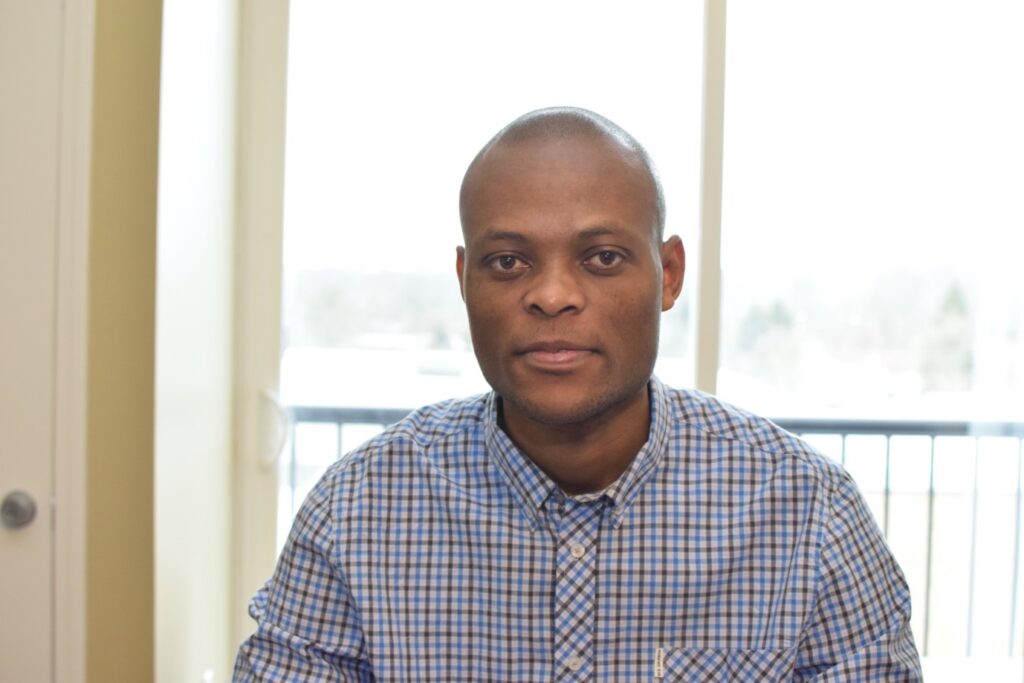

References
Jacob, Thabit. (2017). ”Competing energy narratives in Tanzania: towards the political economy of coal” African Affairs, 116/463. 341-353
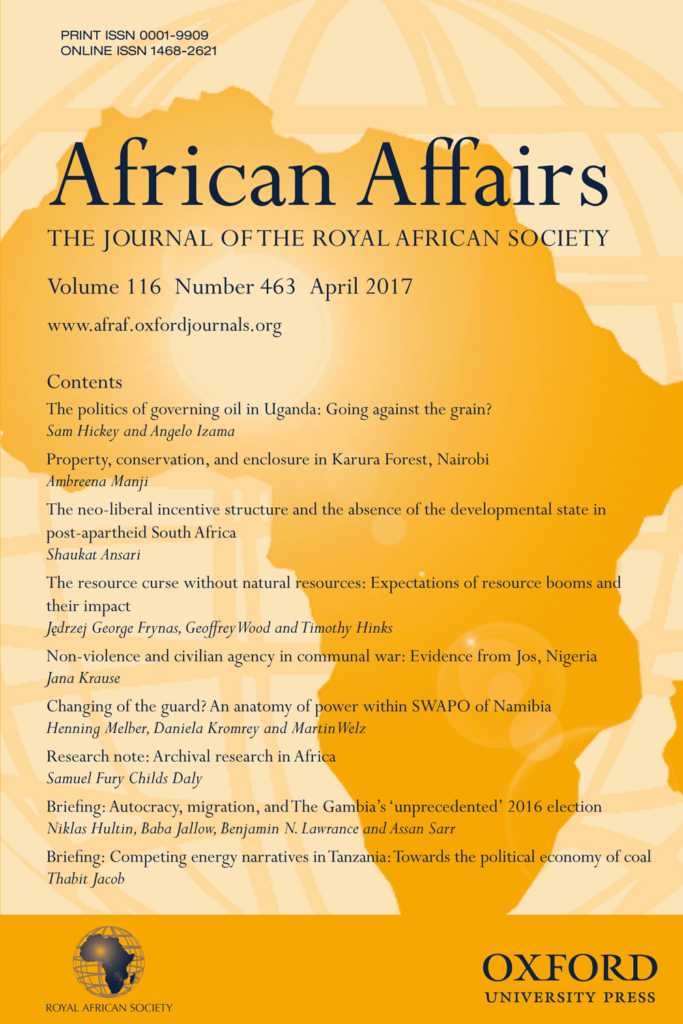
Jacob, Thabit. (2018). State caught in the middle: Coal extraction and community struggles in Tanzania. København: Danish Institute for International Studies (DIIS). DIIS Working paper, No. 2018:8
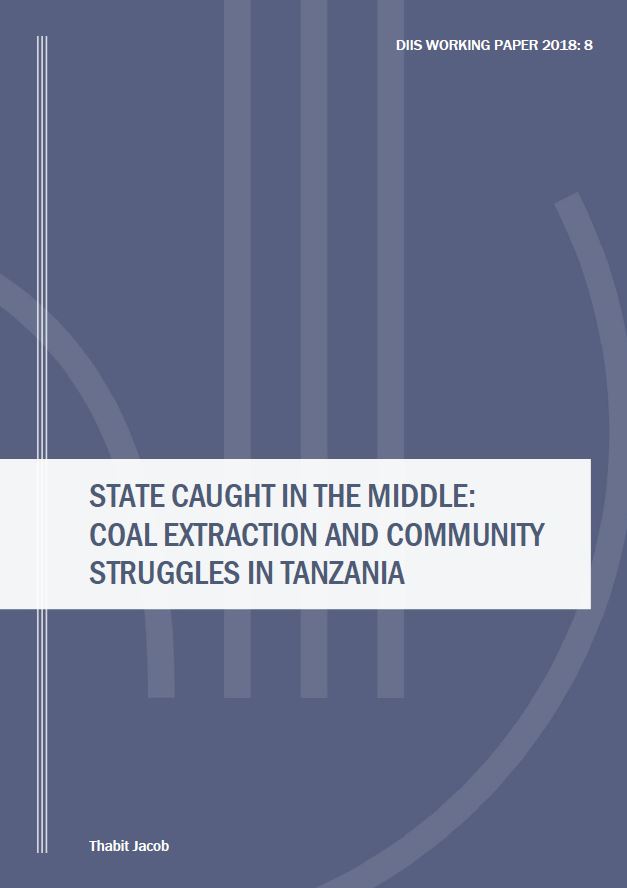
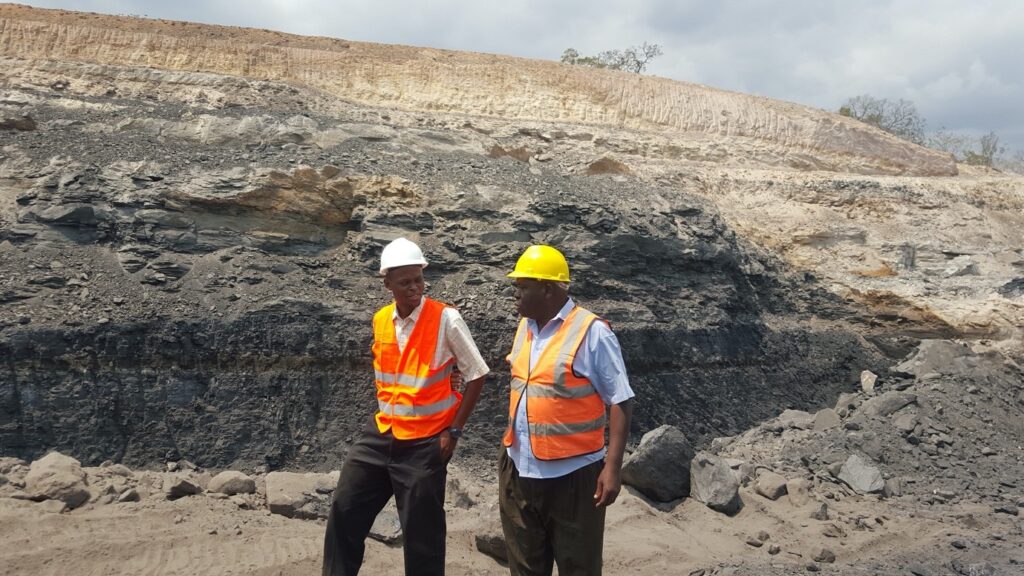

![]()
![]()
![]()
![]()


